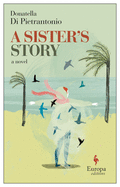
| Publisher: | Europa Editions | |
| Genre: | Women, Friendship, Family Life, Literary, Fiction, Siblings | |
| ISBN: | 9781609457471 | |
| Pub Date: | April 2022 | |
| Price: | $17 |
| Fiction |
by Donatella Di Pietrantonio, trans. by Ann Goldstein
Award-winning Italian writer Donatella Di Pietrantonio made her English-language debut with the lauded A Girl Returned, deftly translated from the Italian by Ann Goldstein (best known for her elegant Elena Ferrante translations). Author and translator return to the characters from their earlier collaboration with A Sister’s Story, another simmering, intense novel of dysfunctional relationships and destructive secrets that proves equally strong as a companion sequel or standalone title.
A literature professor at the University of Grenoble is pulled from her class to answer an urgent phone call. An unfamiliar voice urges her immediately back to coastal Pescara, Italy, where a terrible accident has befallen her younger sister, Adriana. Narrating the journey home, toward a fraught sororal reunion, the protagonist--writing intimately in first person, ignoring temporal linearity--reveals years of complications and connections shared (and not), especially between sisters.
Adriana and the narrator are the only daughters among five (living) children in a struggling, combative, working-class family. The narrator, however, was raised by an aunt and uncle in "the city," and for much of their lives, Adriana "has never been tactful, she interjects herself into everything that has to do with me as if it were also hers," the narrator observes.
Di Pietrantonio radiantly conjures small, piercing moments that linger between characters, turning sparsely written pages into surprisingly dense examinations of resonating reactions and enduring consequences: a fish Adriana expertly guts and cooks, a tiny mosquito in a gelato shop, an errant hair mixed into tagliatelle. Her sharp examinations haunt and illuminate, transforming the quotidian into the indelibly literary. --Terry Hong, Smithsonian BookDragon
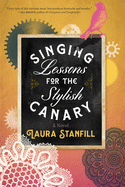
| Publisher: | Lanternfish Press | |
| Genre: | Magical Realism, Fantasy, General, Fiction, Historical | |
| ISBN: | 9781941360613 | |
| Pub Date: | April 2022 | |
| Price: | $18.99 |
| Fiction |
by Laura Stanfill
Singing Lessons for the Stylish Canary, Laura Stanfill's debut novel with a folktale style as lyrical as its melodious title, beckons readers to the rainy but inviting 19th-century French village of Mireville. The women of the town produce lace, and the men, specialty music boxes. Then suddenly a baby appears, one who exhibits magical powers.
On the day in 1814 when colicky Georges Blanchard stops crying, Mireville's waterlogged gloom ends as "gray gave way to blue with an ebullient gold centerpiece." Georges, hailed as the "Sun-Bringer," goes to New York at age 21 to secure orders for the famous Mireville serinettes, music boxes created to train canaries to replicate their songs. Georges is delighted when Delia, an irrepressible purveyor of canaries, welcomes him with a warm intimacy. He returns to Mireville to marry and then father Henri, a sensitive boy "longing to prove himself" to Papa. To Georges, Henri was "the music of his life. Except, as it turns out, another melody had taken root as well."
This whimsical historical fantasy belongs to Henri's generation, including Henri's best friend Aimee, the clever village girls of her Shadow Council of Apprentice Lacemakers and the other "melody," known only by Delia's letters from New York. Bursting with imagery ("Fall cranked itself into winter," writes Stanfill, "then spring, one season playing into the next without a rest or a breath mark between them"), the novel unexpectedly turns dark, then adventurous. One evil act drives both Henri and Aimee from France but, returning to its happily-ever-after mood of whimsy, the story journeys to a new world, with surprising assistance from a kindred spirit. --Cheryl McKeon, Book House of Stuyvesant Plaza, Albany, N.Y.
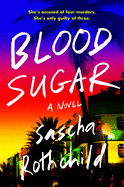
| Publisher: | Putnam | |
| Genre: | Psychological, Suspense, Thrillers, Fiction | |
| ISBN: | 9780593331545 | |
| Pub Date: | April 2022 | |
| Price: | $27 |
| Mystery & Thriller |
by Sascha Rothchild
Sascha Rothchild (How to Get Divorced by 30) draws readers into a suspenseful and disturbing character study of an unrepentant killer in Blood Sugar, her first novel.
It isn't Ruby Simon's fault people have a habit of turning up dead around her, even if she did murder them. When, at the age of five, she drowned a seven-year-old boy, she "waited for guilt to set in. But it never did." She did it to protect her sister, whom the boy bullied. As a teen, she felt no guilt for killing a friend's father when he tried to assault her. She's gotten away with it, until now. Thanks to the sudden death of Ruby's husband, Jason, Detective Keith Jackson has noticed the trail of bodies in her wake and is convinced she murdered her spouse. Caught in a game of cat and mouse, Ruby pleads her case to readers in chapters alternating between her past crimes and her present predicament. Of course she didn't kill her husband, she insists. She's only killed two people. Well, to be precise, she did kill a third victim and failed to mention it to readers up front. Still, even if she killed three people and lied to readers, she still wouldn't murder the man she loved and lie to readers. Honest.
Rothchild perfectly paces the shifts between humanizing her narrator to make her tension over the investigation sympathetic and dropping bombshell reminders that Ruby is a cold-blooded killer. This disturbing thriller begs to be inhaled in a single sitting. --Jaclyn Fulwood, blogger at Infinite Reads
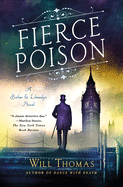
| Publisher: | Minotaur | |
| Genre: | Mystery & Detective, Traditional, Fiction, Historical | |
| ISBN: | 9781250624796 | |
| Pub Date: | April 2022 | |
| Price: | $27.99 |
| Mystery & Thriller |
by Will Thomas
Fierce Poison, a stylish and entertaining homage to the stories of Sherlock Holmes, is the 13th novel in the Barker & Llewelyn series from author Will Thomas (Dance with Death). Set in London in 1893, the novel follows Thomas's tradition of mixing the cerebral with action through well-defined characters, and featuring private inquiry agent Cyrus Barker--well-versed in myriad self-defense techniques, gleaned from his global experiences--and the scholarly Thomas Llewelyn, once unjustly imprisoned.
The brain-and-brawn approach works well in Fierce Poison, in which Barker and Llewelyn track a murderer with a high body count. Roland Fitzhugh, a respected member of Parliament, bursts into the detectives' office, asks for water and then dies before taking a sip. They soon learn that, less than an hour before his death, Fitzhugh had complained to Scotland Yard that someone had been trying to poison him. In an attempt to find out if Fitzhugh really was poisoned, the detectives gain a client: Prime Minister William Gladstone, who insists he will pay the detectives to find out what happened. Their investigation barely begins when an East End family is also poisoned. The link seems to be raspberry tarts, which a street vendor had given to one of the children.
Thomas keeps the suspense high as the brisk plot reaches a believable finale, making the most of the friendship between Barker and Llewelyn and their mutual respect. A hint at Barker's mysterious past adds flavor to Fierce Poison. --Oline H. Cogdill, freelance reviewer
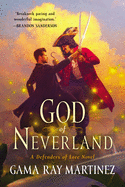
| Publisher: | Harper Voyager | |
| Genre: | Fairy Tales, Folk Tales, Legends & Mythology, Fantasy, Adaptations & Pastiche, Fiction, Historical | |
| ISBN: | 9780063014633 | |
| Pub Date: | April 2022 | |
| Price: | $27.99 |
| Science Fiction & Fantasy |
by Gama Ray Martinez
God of Neverland will charm fans of J.M. Barrie's original Peter Pan and the many retellings and interpretations that have followed.
Michael Darling never wanted to return to Neverland. He is the last of the Lost Boys to remember his time there, but he's put all of that behind him now. Sure, he followed that period of childhood adventure by joining the Knights of the Round, a secret organization fighting to protect humanity from the supernatural. But he chose to walk away from that and engage in as ordinary a life as possible--that is, until the Knights summon him. They inform him that Peter Pan has gone missing, which will have dire consequences for Neverland and all children. Despite his longing for a normal life, Michael finds himself heading back to that mysterious island, which is just past the second star to the right and straight on until morning.
Gama Ray Martinez (Beastwalker) brings readers swashbuckling pirate duels, encounters with mermaids and appearances by beloved characters such as Wendy Darling and Tinkerbell. But there are also ghosts, witches, a trip to the Underworld and plenty of monsters to battle. If sometimes slow-paced and predictable, it is still an enjoyable story that occasionally probes with poignancy the space between childhood and adulthood. By rejoining the Darlings on this slightly darker adventure, readers--much like Michael--might just remember how to tap into their own memories as well as the very spirit of childhood belief. --Michelle Anya Anjirbag, freelance reviewer
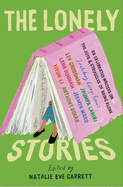
| Publisher: | Catapult | |
| Genre: | Biography & Autobiography, Literary Figures, Inspiration & Personal Growth, Psychology, Body, Mind & Spirit, Mental Health, Literary Collections, Essays | |
| ISBN: | 9781948226608 | |
| Pub Date: | April 2022 | |
| Price: | $16.95 |
| Essays & Criticism |
by Natalie Eve Garrett, editor
Nobody likes loneliness, but aloneness? It has its perks. Such is the consensus among the contributors that editor Natalie Eve Garrett (Eat Joy: Stories & Comfort Food from 31 Celebrated Writers) assembles for her gutsy and illuminating anthology, The Lonely Stories: 22 Celebrated Writers on the Joys & Struggles of Being Alone.
Though each of her contributors has a different take on being lonely, more than one writer touches on the particular flavor of loneliness that accompanies grief, being an immigrant or living through the Covid-19 pandemic. For one writer, the loneliness of a loveless marriage is ultimately cured by aloneness. Several contributors remark on the stigma of going solo, and a couple note a double standard: in "A Strange and Difficult Joy," Helena Fitzgerald observes that in popular culture "we have 'the bachelor pad' and 'the bachelor lifestyle' but no such phrases for women."
Garrett opts for an elastic definition of "alone," and it serves The Lonely Stories well. Of the clutch of contributors who take the word literally, such as those who describe attending writerly retreats, all revel in the social isolation, although Lev Grossman cautions against indulging in the romance of solitude too soon. He writes in the hilariously self-deprecating "Maine Man" about his "voyage of literary self-discovery" right out of college: artists "didn't need other people.... My little chrysalis of genius was going to seat one and one only." It was one too many, because six months of only Lev Grossman was all Lev Grossman could take. --Nell Beram, author and freelance writer
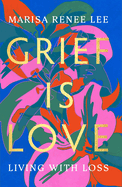
| Publisher: | Legacy Lit | |
| Genre: | Self-Help, Biography & Autobiography, Family & Relationships, Death, Grief, Bereavement, Black Studies (Global), Cultural, Ethnic & Regional, African American & Black, Social Science | |
| ISBN: | 9780306926020 | |
| Pub Date: | April 2022 | |
| Price: | $26 |
| Psychology & Self-Help |
by Marisa Renee Lee
In the beautiful and thought-provoking Grief Is Love: Living with Loss, Marisa Renee Lee explores the idea of grief as love, coming to understand grief not as something to "get over" but rather a constant presence that stands as a testament to those we've loved and lost. Lee's own journey involving grief started early. Her mother was diagnosed with multiple sclerosis and, later, stage 4 breast cancer, and then Renee herself experienced a miscarriage and fertility problems. She writes with candor about her grief, first repressing and denying it but eventually working her way toward giving herself permission to grieve "out loud."
As much as Lee draws on her own experiences to shape Grief Is Love, the book is not so much a memoir as a kind of personal guide, both for those grieving and those seeking to support someone through loss. Within that, Lee places grief in a 21st-century American context, identifying the role of race in grieving as well as the magnitude of grief brought about by the Covid-19 pandemic. "We can no longer afford to ignore grief," she writes, "to relegate it to whispered conversations, to expect folks to navigate their brokenheartedness on their own." Grief Is Love is, in a way, a call to action, but more so a call to compassion: let us not grieve alone or ask others to, Lee suggests. There is power and healing in community and in standing together to acknowledge the weight of loss and what it means to go on living when someone we love does not. --Kerry McHugh, freelance writer
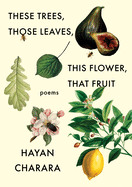
| Publisher: | Milkweed Editions | |
| Genre: | Middle Eastern, American, General, Poetry, Haiku | |
| ISBN: | 9781571315410 | |
| Pub Date: | April 2022 | |
| Price: | $16 |
| Starred | Poetry |
by Hayan Charara
Poet Hayan Charara (Something Sinister), the first-generation American son of Lebanese immigrants, is a multifaceted writer, equally comfortable in the long, languid line and the short poem, terse and biting. His fourth poetry collection, These Trees, Those Leaves, This Flower, That Fruit, shows off his range, starting with its gorgeous title. Taken from a line in the poem "Under the Sun," the title demonstrates the poet's facility with cadence, whether a rhythmic pulse standing alone or in the midst of this longer poem, which asks, "Which is holier,/ oak or linden?/ The pleasure of the oak,/ the sorrow of the linden." This follows the first poem in the collection, "Self-Portrait in Retrospect," a short gut-punch of a piece on age, beauty and identity. Most of the poems in the first section are brief, including a section of "Unresolved Haiku."
Following a section break, Charara turns to longer pieces, each line lengthening and each poem teetering on the edge between prose and poetry. This section, broken into two long poems, draws on the words of others, whether biblical or Homeric allusions in "Prelude" or the interwoven quotes in "Fugue" from sources such as Alan Watts and Philip Levine. These selections are also more overtly political, addressing issues of war, racism and the implications of the word terrorism. The final section returns to the style of the first, with wry reflections on loss and grief, asking: "To what wisdom/ does suffering/ give birth?/ --and must we always/ learn from it?" Charara offers few answers but insists the questions themselves are worthwhile. --Sara Beth West, freelance reviewer and librarian

| Publisher: | CavanKerry Press | |
| Genre: | Women Authors, Death, Grief, Loss, Family, Poetry, Subjects & Themes | |
| ISBN: | 9781933880921 | |
| Pub Date: | April 2022 | |
| Price: | $18 |
| Starred | Poetry |
by Susan Jackson
In the stirring poetry collection In the River of Songs, Susan Jackson (Through a Gate of Trees) gilds everyday experiences and unbearable losses with spiritual significance.
"So what lasts?" Jackson asks. "All the people of my family are gone/ and mourned and I am alone save for you." Yet the book's opening poem, "The Woman Who Loved Trees," posits that grief can be transformed and that there might be beauty in change: after beloved cottonwoods are cut down, the space they leave becomes "a singing bowl" and "solitude became her companion/ in her changed landscape." This search for what is hidden and sacred is a pattern in the book. As a piece about her late mother's dementia concludes, "here I thought this poem/ was about what's lost/ but instead turns out to be for every unexpected gift we're/ given."
Jackson's subject matter includes the momentous: her father's death when she was young, the time she witnessed a woman drop dead at an art fair, and a soap bubble that serves as a metaphor for life's transience. At other times the poems touch on the ordinary: making beds, cutting peonies in the garden, watching fledgling wrens or peeling a clementine. Joy is found in simple things, like a perfect boiled egg or a massage. The poetry includes gorgeous nature imagery and alliteration, which will appeal to fans of Mary Oliver. Its up-to-date conscience alludes to Covid-19 and the murder of George Floyd. But the outlook, one that finds "a wedge of eternity" in daily life, feels timeless. --Rebecca Foster, freelance reviewer, proofreader and blogger at Bookish Beck
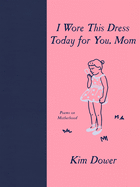
| Publisher: | Red Hen Press | |
| Genre: | Women Authors, American, Love & Erotica, Death, Grief, Loss, General, Family, Poetry, Subjects & Themes | |
| ISBN: | 9781636280233 | |
| Pub Date: | April 2022 | |
| Price: | $19.95 |
| Poetry |
by Kim Dower
Kim Dower's I Wore This Dress Today for You, Mom finds the former City Poet Laureate of West Hollywood celebrating a colorful mosaic of mothering moments that range from the spiritual to the practical. This poetry collection also pays homage to the matriarchs in her life, including her Russian grandmother, and their different mothering styles.
Widely admired for her ability to texturize the everyday with the sublime, Dower (Sunbathing on Tyrone Power's Grave) captures with poetic grace exquisite remembrances of childhood and the special pains and pleasures of mothering a child about to fly the nest. In "I Lost My Mother in Bloomingdale's," the author tries on a frilly bathing suit when she realizes with horror that her mentally fragile mom has left the store without any ID or money. The title poem, suffused with tenderness, touches upon the core of a mother-daughter relationship and the desire to please one's parent, while "There Will Be Things You Do" relishes the inherited behaviors that are passed on through generations. Dower explores female physicality with a splendid ode to breasts, thanking them for their companionship, and describes such mundane experiences as getting a root canal and doing the dishes with vibrant imagery.
Featuring gorgeous gems from Dower's four poetry collections and new pieces energized by the sheer power of her wit and irreverent style, I Wore This Dress Today for You, Mom will make readers both groan at and delight in recognition of the everyday absurdities and magical moments that add up to a lifetime of irreplaceable memories. --Shahina Piyarali, reviewer
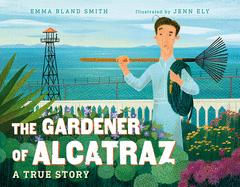
| Publisher: | Charlesbridge | |
| Genre: | Biography & Autobiography, General, Juvenile Nonfiction | |
| ISBN: | 9781623541606 | |
| Pub Date: | April 2022 | |
| Price: | $16.99 |
| Starred | Children's & Young Adult |
by Emma Bland Smith, illust. by Jenn Ely
Here's the thing, see: with The Gardener of Alcatraz: A True Story, Emma Bland Smith and Jenn Ely have created this really terrific picture book biography of a crook who turned his life around. And get this: the narrator sounds like an old-movie tough guy right outta the story's setting! As the narrator puts it after the crook goes straight, "Swell!"
What happens is, after this guy Elliott Michener gets busted for counterfeiting, he's sent to Alcatraz, the roughest, toughest prison there is. At first Michener isn't sold on rehabilitation--he figures he'll break out and maybe take up counterfeiting again, or else knock off a bank. But when he finds a key in the prison yard, does he try it in every gate at the joint? Naw--he turns in the key! So the guards let Michener help with the gardening. And holy smokes, the jailbird likes the job! Sure, maybe not for the right reason at first....
With The Gardener of Alcatraz, Smith (The Pig War) has produced a humane and moving story, and Ely (If You Were a Kid Building a Pyramid) captures the emotional nub of every scene, using a gloomier palette to reflect Michener's darker days and a brighter one to reflect his expanding horizons. Back matter offers historical context (the year that Michener landed at Alcatraz--1941--is curiously missing from the main text) and discusses changing attitudes toward rehabilitation: "Today experts know that giving incarcerated people meaningful work is important and worthwhile." Swell! --Nell Beram, freelance writer and YA author
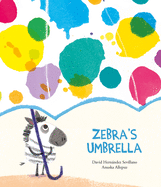
| Publisher: | NubeOcho | |
| Genre: | Friendship, Values & Virtues, Animals, Jungle Animals, Social Themes, Juvenile Fiction, Diversity & Multicultural | |
| ISBN: | 9788418133367 | |
| Pub Date: | April 2022 | |
| Price: | $15.99 |
| Children's & Young Adult |
by David Hernández Sevillano, illust. by Anuska Allepuz
David Hernández Sevillano's deceptively simple text and Anuska Allepuz's clever use of perspective and space splendidly combine in the endearing Zebra's Umbrella.
When rainfall on the savanna catches a group of animals off guard, they inquire one by one if they can take shelter under Zebra's colorful umbrella. Zebra is generous with his space and continues to make room as the rain's intensity increases. At first the animals contentedly sip hot chocolate and enjoy "stories, riddles, games and songs" while waiting for the rain to subside.
Allepuz (The Boy, the Bird, and the Coffin Maker) cleverly uses the book's gutter to highlight sudden unspoken tension among the animals. A soaking Lion, positioned on the edge of the right page, approaches the group of fearful animals, placed at the edge of the left page. Zebra alleviates the uneasiness by setting a boundary: "You're getting wet. Come on under. But there will be no biting us!" The subsequent wordless full spread zooms in on Rhinoceros, Lion and Elephant, whose angled eyes and raised eyebrows reveal a mix of uncertainty and suspicion. When the perspective zooms back out, the animals are once again--safely--enjoying stories, riddles, games and songs. As the sun begins to shine, Lion smiles and questions Zebra, "Why is your umbrella so colorful?" Zebra's response is at once reassuring and surprising: "So you can find me when it's raining."
Sevillano and Allepuz use a combination of disparate creatures and subtle nods to predator and prey animals to model themes of generosity and acceptance in this sweet picture book. --Kieran Slattery, freelance reviewer, teacher, co-creator of Gender Inclusive Classrooms
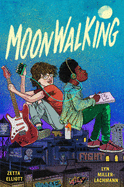
| Publisher: | Farrar, Straus and Giroux Books for Young Readers | |
| Genre: | Friendship, Art, Music, United States - 20th Century, Social Themes, Stories in Verse (see also Poetry), Juvenile Fiction, Prejudice & Racism, Performing Arts, Historical, Neurodiversity | |
| ISBN: | 9780374314378 | |
| Pub Date: | April 2022 | |
| Price: | $16.99 |
| Children's & Young Adult |
by Zetta Elliott, Lyn Miller-Lachmann
In the captivating middle-grade novel Moonwalking, two boys in 1980s Brooklyn form an unlikely friendship through music and art. Co-authors Zetta Elliott (Dragons in a Bag) and Lyn Miller-Lachmann (Rogue) use poetry to tell the delicate and painful story of the boys' short-lived friendship.
Joseph John "JJ" Pankowski is the new kid at school, and one of the only white and Polish faces in a sea of brown. Afro-Latinx Pierre "Pie" Velez is a math and history genius as well as a graffiti artist. When Pie sees JJ (who was told by his old school that he had "pervasive developmental disorder") being mistreated in the cafeteria, he invites him to have lunch in the art room. The middle schoolers, both with difficult home lives, connect through their love of the arts--JJ loves punk rock and Pie is fascinated with Jean-Michel Basquiat's work. The pair quickly become friends, but their relationship is threatened when Pie is caught tagging a building and almost arrested.
Elliott and Miller-Lachmann use dual points of view to bring this heartwarming but also painful novel-in-verse to life. The authors' deliberate styles highlight the difference between the boys--Miller-Lachmann writes JJ through short, multilayered poems with text that is sometimes scattered across the page; Elliott's Pie text is fluid, musical and intentional. They delicately cover topics that include interracial friendships, abuse, mental health, immigration, disabilities, class and the sense of belonging in language that is easily accessible to middle-grade readers. --Natasha Harris, freelance reviewer